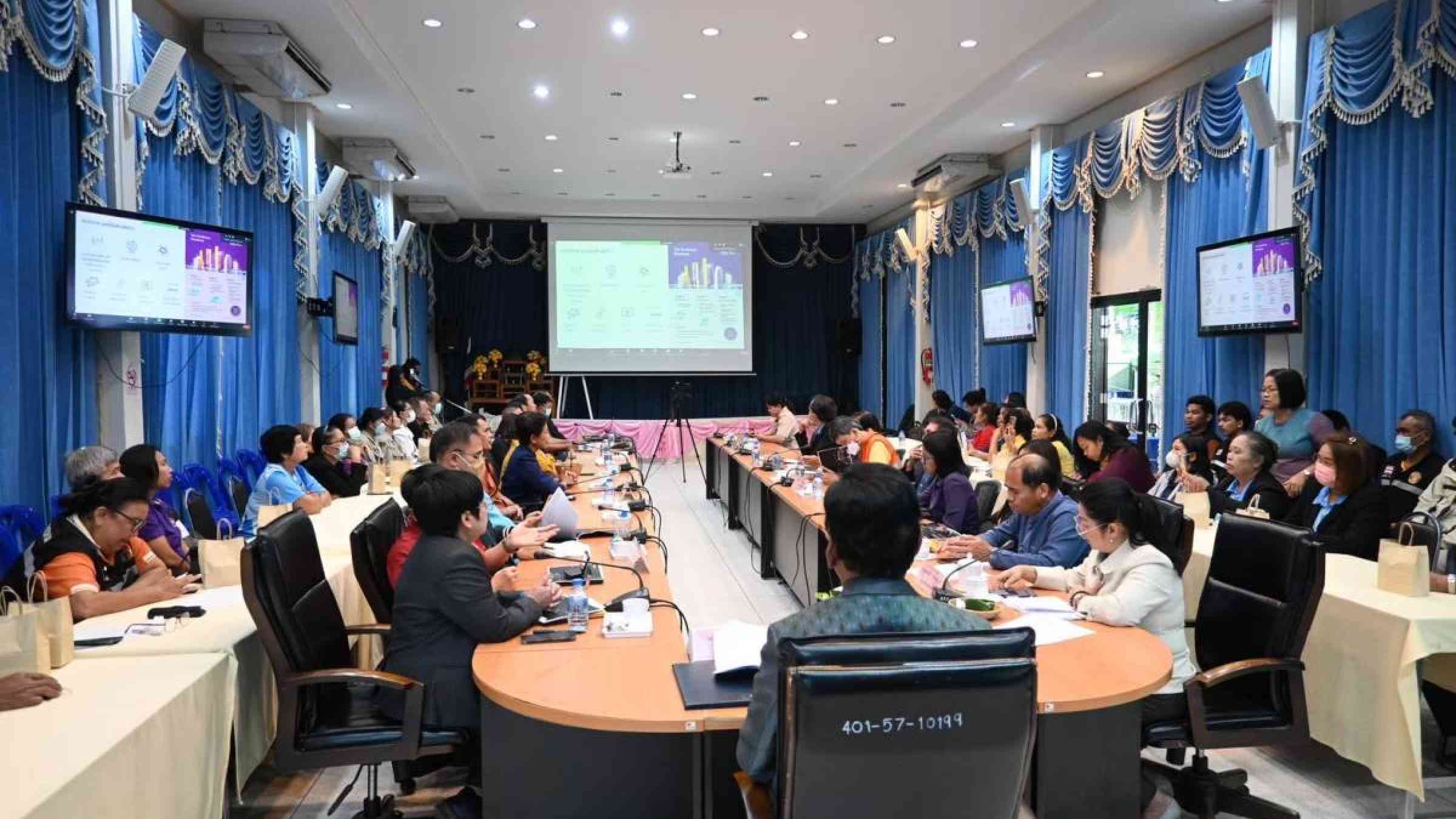Thai universities support city resilience

Thailand has been on an extraordinary journey with the Making Cities Resilient 2030 (MCR2030) initiative since 2022.
It all began with the inaugural MCR2030 training for local universities – a collaboration involving the United Nations Office for Disaster Risk Reduction (UNDRR), the United Nations Development Programme (UNDP) Thailand and the Thai Disaster Preparedness Foundation (TDPF).
This training in November 2022 brought together participants from 17 universities, uniting them under the Thai Network for Disaster Resilience (TNDR) in partnership with TDPF, alongside media representatives, three local governments and the Department of Disaster Prevention and Mitigation (DDPM).
It strengthened the capacity of academia and local governance on urban resilience, emphasizing the crucial role academia plays in providing technical support to local governments on their journey towards resilience.
University links with city
Mahasarakham University, in Thailand's northeastern region, is the first university to partner with a municipality to support its disaster resilience ambitions and actions.
The university built a strong partnership with Mahasarakham Municipality, introduced it to the tools offered by MCR2030 and provided technical support in using these tools to assess disaster risks. This collaboration culminated in the launch of a first MCR2030 capacity-building initiative in the country between Mahasarakham University and Mahasarakham municipality. Both entities then participated in a training session in March 2023 at the UNDRR Global Education and Training Institute in Songdo, Incheon, Republic of Korea.
The training attracted participation from the Thai national government (DDPM), the National Municipal League of Thailand (NMT), local governments (Bangkok and Mahasarakham) and Mahasarakham University and provided practical insights into the application of the Ten Essentials for Making Cities Resilient and the Disaster Resilience Scorecard, serving as a catalyst for substantive discussions among multi stakeholders at national and local level. This dynamic exchange fostered city-to-city learning and the sharing of best practices, playing a pivotal role in bolstering the resilience of municipalities throughout Thailand.
Municipality leads on scorecard assessment
Phitsanulok Municipality was the first in Thailand to complete the Disaster Resilience Scorecard assessment with the support from a local university. It continued its leading role on urban resilience and partnered with Naresuan University from northern Thailand to arrange a first urban resilience training workshop as a follow-up to the scorecard assessment. This partnership has been elaborated through collaboration between Naresuan University members of the project ‘Strengthening University Enterprise Collaboration for Resilient Communities in Asia’ (SECRA), co-funded by European Commission through the Erasmus+ program grant, and Thai Network for Disaster Resilience (TNDR).
This workshop deepened the understanding of using the results of the Scorecard as an input for Thailand's national assessment and planning, including local Disaster Prevention and Mitigation planning, Local Performance Assessment (LPA), and Integrity and Transparency Assessment (ITA). It also marked the second occasion where a local university spearheaded such a training. Furthermore, Mahasarakham University took on a mentorship role, guiding Naraesuan University on how to lead a training for local government using MCR2030 Scorecard tools.
In southern Thailand, Prince of Songkhla University organized a workshop on DRR and urban resilience for Prik Municipality. The university also collaborated with Thai PBS, a prominent Thai broadcast agency, to host a one-day workshop for six municipalities within Sadao District of Songkhla province. This event underscored the significance of risk profiling at the local level, risk assessment, the enhancement of urban resilience, and multi-stakeholder engagement.
Optimized data collection
December 2023 marked a significant milestone as Talad Municipality and Mahasarakham University combined forces to host a MCR2030 Scorecard workshop. This exhaustive assessment drew a diverse array of stakeholders, including village health workers, hospitals, schools, agricultural groups and engineers.
The collective consensus underscored the pressing need for enhanced data management, prompting the university and municipality to jointly set up a dedicated web portal to optimize data collection. Moreover, following on from the Midterm Review of the Sendai Framework for Disaster Risk Reduction 2015-2030, the importance of an adequate understanding of risk in local and municipal governments and maintaining dialogue between national, regional, and global risk government entities has been emphasized.
It has further been recognized that improving the capacity of disaster risk management entities is crucial and requires financial investment, the development of expertise, and the use of technological innovations. Reflecting on Thailand’s inspirational journey towards urban resilience, it is clear that Thai cities and local universities have not only made remarkable progress in building urban resilience but have also fostered collaboration between universities to provide technical support to local governments. Armed with knowledge, innovation and a deep understanding of their unique urban landscapes, they continue to rewrite the story of urban development, one resilient step at a time.

